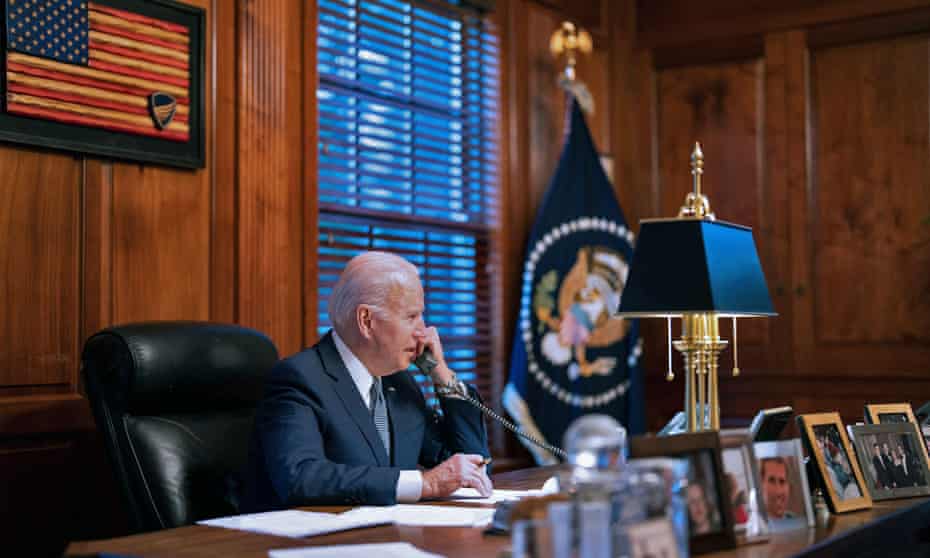Biden Urges Putin to De-escalate Ukraine Tensions
By Anita Powell December 30, 2021
U.S. President Joe Biden on Thursday "urged Russia to de-escalate tensions with Ukraine" in a 50-minute call with his Russian counterpart, the White House said. A senior administration official added that President Vladimir Putin made no concrete promises about the tens of thousands of Russian troops massed along the Ukrainian border.
Biden "made clear that the United States and its allies and partners will respond decisively if Russia further invades Ukraine," White House press secretary Jen Psaki said in a statement.
A top Kremlin official told journalists that during the call, Biden again warned Putin that the U.S. and its allies would exert serious economic sanctions if Russia invaded Ukraine. Putin responded with a warning of his own: Such a move could lead to a complete rupture in U.S.-Russia relations.
Psaki added that the two nations would participate in three separate rounds of talks next month: first through bilateral talks scheduled to start January 10, and then through two sets of multiparty talks with the NATO-Russia Council and at the Organization for Security and Cooperation in Europe.
"President Biden reiterated that substantive progress in these dialogues can occur only in an environment of de-escalation rather than escalation," she added.
For months now, Putin has built up troops along the Russia-Ukraine border. U.S. intelligence officials have estimated, from looking at satellite photos, that as many as 100,000 troops are in the area. Meanwhile, Ukraine has been building up its own defenses on its side of the border.
For years, the former Soviet state has been seeking entry into the North Atlantic Treaty Organization, alongside the U.S. and other Western nations. Russia strongly opposes that move.
Kremlin pleased
Putin foreign policy adviser Yuri Ushakov said the Kremlin was pleased with the talks, but he also said that Putin pushed Biden for concrete results from the upcoming security talks. Russia's demands include that NATO deny membership to Ukraine and that the security alliance reduce its deployments in Central and Eastern Europe. White House officials have declined to discuss their terms publicly.
This was the second time this month that the two men had held direct talks. According to Leon Aron, an analyst with the American Enterprise Institute, it was the eighth time that the U.S. and Russian leaders have met in one year. That, he said, is "a record in the entire history of U.S.-Russian and U.S.-Soviet relations."
Biden administration officials said that the two had a "serious and substantive" discussion. But a senior administration official said that Putin made "no declarations as to intentions." The two presidents will not participate in the high-level talks set for January 10 in Geneva.
Although analysts seem to doubt Putin will invade Ukraine, they worry that tens of thousands of battle-ready troops in the region could accidentally or intentionally spark a war.
"If he is bluffing, then it is a very serious bluff, which entails particular risks to Putin, because he has to make sure that 100,000 troops-plus are occupied and ready - but not taking the initiative themselves before an order is given," said Will Pomeranz, deputy director of the Wilson Center's Kennan Institute. "So I think that it is just simply a situation that is fraught with peril on both sides."
The White House has said repeatedly that there will be "significant consequences" if Russia invades, including harsh economic sanctions and increased security support for Ukraine. Ukraine's president, Volodymyr Zelenskiy, tweeted Wednesday that U.S. Secretary of State Antony Blinken vowed "full [U.S.] support for [Ukraine] in countering Russian aggression."
A compromise?
"Both presidents essentially have their backs against the wall," Aron told VOA. "Putin's ultimatum is no more expansion of NATO, withdrawal of NATO troops from the Baltics and, most importantly, a promise to never have Ukraine inside NATO. In essence, on all those three, Biden said, 'No.' So the question is: Will they arrive at some sort of compromise?"
And like many analysts, he postulated that Putin is posturing, projecting strength ahead of key elections in two years.
"Putin successfully creates a sense of emergency, if you notice the language is almost the same: He's about to start a war, he's about to invade Ukraine," he said. "And apparently, the White House goes for it. I wouldn't, because, I wrote, and I also spoke about this, Putin is not going to invade Ukraine at this time. He's playing to his domestic audience. And all of this is a part of the game that Putin is playing, and I think will continue to play at least until his elections in 2024."
Some information for this report came from Agence France-Presse










